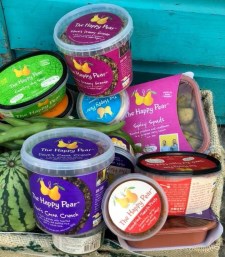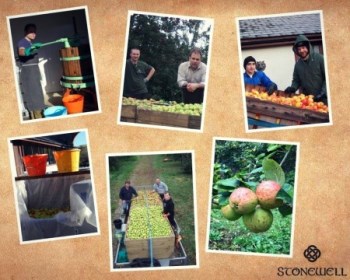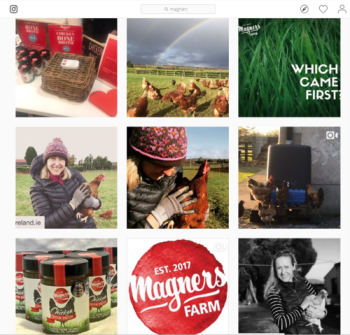How Social Media Can Help You Grow Your Food Business
Jan 23, 2019,
by Deanna O'Connor - Category: Retail Ready

Social media is the essential marketing tool of our time. When used consistently and smartly, it can work wonders to create a ready-made following for a new food product.
Part 2 of our interview with Retail Consultant and Food Academy Mentor James Burke.
Case Study: The Happy Pear
 The Happy Pear, now a brand, originally a vegetable shop run by twin brothers in the seaside town of Greystones, Co Wicklow, is a great case study for any food business to be inspired by. The Happy Pear boasts over 830,000 people on its digital media platforms (131,000 on Facebook, 277,000 on Instagram, 39,700 on Twitter and 390,000 subscribers on YouTube). Over time their business has expanded to include not only the vegetable shop but a cafe, a series of vegetarian cookbooks, and a branded food range which today includes ready meals, soups, pesto, and snack bars available nationwide.
The Happy Pear, now a brand, originally a vegetable shop run by twin brothers in the seaside town of Greystones, Co Wicklow, is a great case study for any food business to be inspired by. The Happy Pear boasts over 830,000 people on its digital media platforms (131,000 on Facebook, 277,000 on Instagram, 39,700 on Twitter and 390,000 subscribers on YouTube). Over time their business has expanded to include not only the vegetable shop but a cafe, a series of vegetarian cookbooks, and a branded food range which today includes ready meals, soups, pesto, and snack bars available nationwide.
The Happy Pear isn’t just selling a product, they are the whole package. Buying the product is buying into a piece of the lifestyle of the twin founders, Dave and Stephen Flynn. “Four-and-a-half years ago they came to Food Academy with no third party supply,” recalls food industry consultant James Burke. “People knew something; they knew what they stood for, they had seen something on social media, read the cookbook—and when they went on shelf, with the Happy Pear products, from West Cork to Donegal the demand was there and they now have 15 products within the Food Academy.”
"Four-and-a-half years ago they came to Food Academy with no third party supply...when they went on shelf, with the Happy Pear products, from West Cork to Donegal the demand was there and they now have 15 products within the Food Academy." James Burke
Building Authenticity Without Breaking The Bank
Consumers today want to buy into brands that resonate with them. “There’s a growing group of consumers out there who are looking for authenticity, and a story,” advises Burke. Using social media to tell a story, or to meet the real person or team behind the product, creates a bond with your potential customer. It is far easier to sell a product to someone who knows the product - and following that - getting to know the product and producer behind the scenes further deepens this relationship.
Using social media to tell a story, or to meet the real person or team behind the product, creates a bond with your potential customer.
 Stonewell Cider recently celebrated their 8th anniversary, sharing photos of how & where the whole adventure began with their fans on Facebook.
Stonewell Cider recently celebrated their 8th anniversary, sharing photos of how & where the whole adventure began with their fans on Facebook.
Instagram is ideally suited to showcasing food. Many people’s Instagram feeds are populated with pictures of food. Instagram Stories allows for daily video updates from behind the scenes. You can not only show the production process behind the product in Stories, but also fill the Instagram feed with beautifully styled food shots.
With social media you can tell the complete product & producer story and begin to build a tangible brand.  For example, an artisan sheep’s cheese producer might film Stories out walking in the fields among the sheep, explaining how the cheese is made. The feed could be filled with mouth-watering images of dishes using the product, and you could drive traffic to your website where the recipes are available. Or perhaps you film recipe videos and post them to YouTube…creating a demand for your product, in order for the person to make the recipe at home.
For example, an artisan sheep’s cheese producer might film Stories out walking in the fields among the sheep, explaining how the cheese is made. The feed could be filled with mouth-watering images of dishes using the product, and you could drive traffic to your website where the recipes are available. Or perhaps you film recipe videos and post them to YouTube…creating a demand for your product, in order for the person to make the recipe at home.
GS1 Member Kylie Magner of Magner's Farm exemplifies this case sharing her day-to-day life on the farm and at farmer's markets locally across her Facebook, Twitter and Instagram accounts, showcasing her pasture reared chickens, eggs and award-winning chicken bone broth.
“Glenilen Farm cheesecakes and yoghurts is another very good example of the use of social media. It’s all about the farm, the milk, and the consumer is able to resonate with that,” Burke points out.
Getting a new product to market requires a not insignificant investment. “If you’re getting a product out and you want it to be national, you’re going to need professional branding and packaging, shelf-life testing, nutritional analysis and all that—you need to have €10,000 in your back pocket,” reckons Burke. “This might not leave much over for marketing but clever use of social media can pay great dividends.”
Before even considering paid advertising on social media, the young food business can make the most of it, with very little investment, using just a smartphone, some time and ingenuity and a host of free photo and video editing and sharing apps.
Brand Building
In a crowded marketplace, retailers need a compelling argument to choose a new product over an existing one and make space on their shelves for it.
Retailers are expecting a lot of new food producers, and more than just a product, producers need to have a story and a recognisable brand. Burke underlines that, “I think what they are interested in first of all, is brand builders, as opposed to products in a packet. A producer must understand that it is not just about putting product on the shelf, it is about using your digital media, entering the awards, talking to journalists and bloggers. The producers that can spot the trend or opportunity, fill it and articulate it well, and that are brand builders, are the ones that will succeed.”
Burke says of the food manufacturers he works with, “They are usually people on a journey somewhere. They’re pre-start up, just getting started or are well-established and they want to bring their brand to somewhere they are not already.” He has seen in practice how using social media has helped people through these stages and aided them to build their market and demand for their products.
The producers that can spot the trend or opportunity, fill it and articulate it well, and that are brand builders, are the ones that will succeed.
Local Enterprise Offices, Food Academy, Bord Bia, and Enterprise Ireland all offer superb supports and mentoring for food businesses. GS1 Ireland can also help with far more than the bar code that is the essential identifier for your product; speak to them today to see how their consultancy services can benefit your business.
 Join the #bestofirish conversation with @GS1Ireland and get your product #RetailReady.
Join the #bestofirish conversation with @GS1Ireland and get your product #RetailReady.
GS1 in conversation with retail consultant James Burke.
Tags: #retailready, Food Academy, SuperValu, Food, James Burke, Best of Irish,